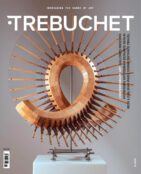Trying to be the next big thing by following the herd!
I’m terminally unfashionable, and find the idea of trying to keep up with it unfathomable. Yet it still exerts some control over me. As soon as some new genre breaks and people start talking about the new style, I almost always have to have a go at it.
I’m usually not very good at it, probably because my hearts not in it. But I think that in another way it’s healthy, as you move out of your normal patterns and sound choices. It opens your mind to possibilities that might not have been there before.
My main failing when frantically jumping on bandwagons is to misunderstand the genre. I’ll most likely hear people joyously proclaiming *something* as the next great game-changing genre, and be tempted enough to look it up, and listen to one or two tracks,and decide that I can do that.
I don’t out-and-out copy, as that strikes me as a waste of time, but I do try to emulate sometimes, and there’s a subtle distinction.
Copying to me means reproducing without thinking – not in a careless one-night-stand way, but in the sense of simply taking what someone else has done, and using it without being interested in how it works, why it works, or what it really is. You just take it and use it.
(This is what causes me some consternation regarding sampling large chunks of other peoples music. Obviously as a musical tool sampling is just using sounds, but the fact that without people actually making that music in the first place there’s be nothing to sample suggests to me there is something no quite right about it, that’s a story for another day!)
Emulating is different – to my mind it means finding the essence of something that you like. Exploring it and taking knowledge from it’s subtleties, rather than copy-and-pasting it. You have to work to understand it and experiment to recreate it, and in the process you learn about it, and add your own spin to the final result.
The urge to recreate what is currently popular is a curious one. I wouldn’t normally say that I’m someone who craves grand public recognition, and yet the only reason I can think of that I’d feel tempted to jump on genre bandwagons is to take advantage of the attention and perhaps get a few people saying “Wow you’re really good, here’s a £££ record contract!”
Or then again maybe I just like to broaden my musical palette. Of course, new styles can come about due to a fashion for a certain instrument, or a change in technology, it’s not just a matter of taste, sometimes just one flash of inspiration can open up a whole new world of possibilities.
Either way, the most beneficial road forward for a creative musician is surely to consider all the boundaries that are unlocked when a new genre appears on the scene, and then to image how many more of these boundaries to your thinking there are, what they might be, and how your music could break through them.
Make Better Music is updated every Tuesday. To catch up on the series search for ‘Dave Graham’.
Image: Francesco Marino / FreeDigitalPhotos.net

David Learnt composition (harmony, counterpoint and orchestration) to degree level through studying Schoenbergs Fundamentals of Musical Composition, the classic text on twentieth century harmony by Vincent Persichetti, Henry Mancini’s Sounds and Scores, Rimsky-Korsakov’s excellent books on orchestration as well as studying any scores that intrigued me. He is a founder member of two bands, avant pop duo Cnut, and orchestral doombience outfit Regolith, and have performed across Europe with them.




















